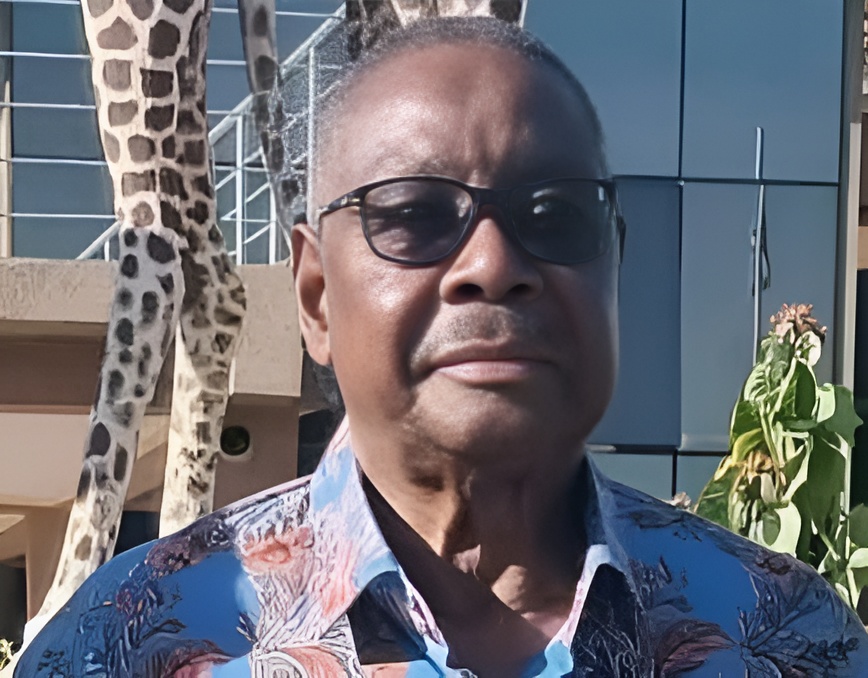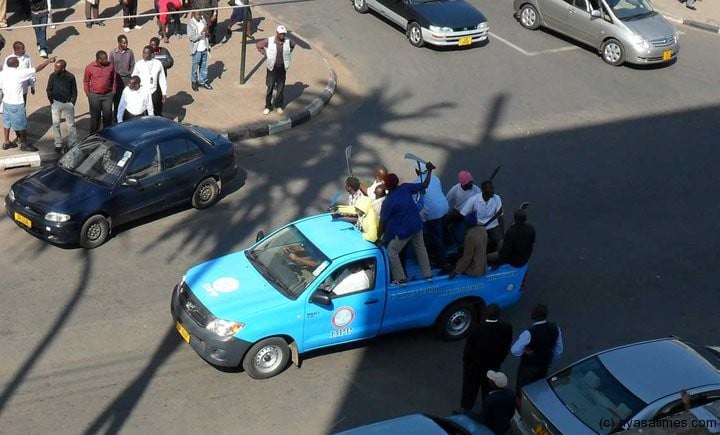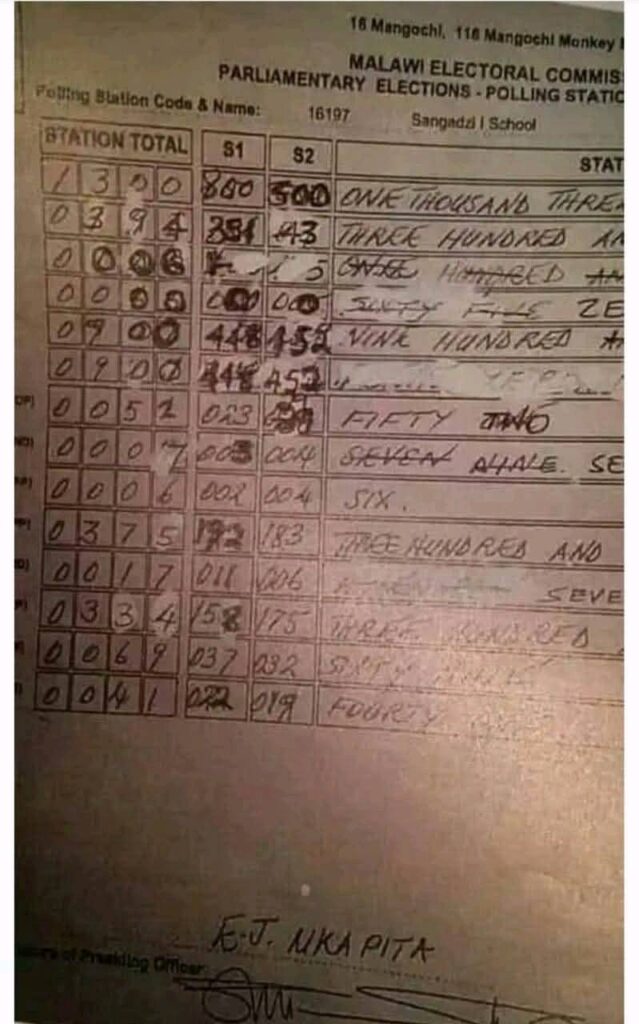When Norman “Pythius Hiwa” Chisale uttered the words: “Bwana chifukwa anakakhala a security anu munakamva kuti ena tawachotsa mabatile, tawagwetsera uko”, during a recent Democratic Progressive Party (DPP) press briefing, he not only shocked his audience with the indecency of his language but also reignited deep concerns about the deteriorating moral fabric and tone of Malawi’s opposition politics.
The word “mabatire” when translated into English reveals a crude reference to the male genitalia—testicles—something utterly offensive in any Malawian setting, let alone in public discourse.
In a nation steeped in rich tradition and guided by time-honored values of respect, humility, and decency, certain lines must never be crossed—especially by those who claim to lead or speak on behalf of the people.
Norman “Pythius Hiwa” Chisale crossed one of those lines.
In Malawian culture — and across much of Africa — public discourse, especially in front of elders and national leaders, demands respect, decorum, and maturity. In all fairness, the word “mabatire” has no place in any such serious political communication.
That Chisale uttered such words in reference to a state law enforcement agency, while aligning himself with the DPP, sends a chilling reminder of the kind of governance and political tone Malawians can expect if the party regains power.
This wasn’t a slip of the tongue. It was a calculated insult. This word would be scandalous in any society. In Malawi, where cultural decorum and reverence for elders and leaders remain sacred, such language is not just indecent; it is a desecration of our national values.

Uttered in the presence of DPP leader and former President Arthur Peter Mutharika, Chisale’s words were not only demeaning to the old man he is trying so much to please and his party, but also a disgrace to the very audience that listened — elders, political leaders, journalists, and the Malawian public.
The use of such a vulgar term in the presence or context of leadership, is also a direct insult to the entire presidency in which his boss previously belonged, as well as to the citizens who expect maturity from their political actors, and to the very moral fiber that binds Malawian society.
One does not need to be a linguist or a cultural anthropologist to understand the weight and impropriety of what Chisale said.
In African, and specifically Malawian tradition, discussions involving private body parts are considered taboo, and certainly never acceptable in public or political forums.
Elders are to be respected, and women and children are to be shielded from vulgarity. What Chisale did was more than a breach of etiquette—it was a symbolic slap in the face to Malawi’s cultural heritage.
This was a show of an imaginable arrogance that has now become of this illiterate man who is poised to do whatever to ensure that he is back in the corridors of power. Chisale’s language and actions are not just personal missteps; they are emblematic of a broader problem within the DPP’s leadership culture—a culture where vulgarity, disrespect, and underhanded tactics are not only tolerated but sometimes celebrated.
No wonder even Mutharika himself was not bothered by such vulgarity coming from someone who works closer to him. For those who believe in a Malawi governed by integrity, mutual respect, and cultural dignity, this is a wake-up call.
Yes, what is perhaps more disturbing than Chisale’s vulgarity is the DPP’s silence. Party leaders, including Peter Mutharika, have yet to publicly distance themselves from Chisale’s remarks or condemn them.
Some of us took this long not to write anything, waiting for a word from the old man or the DPP. To date, there has been no public condemnation from the Professor, the former president, under whose name and legacy Chisale operates.
That silence is deafening. In a party that often touts itself as disciplined and law-abiding, the failure to publicly distance itself from Chisale’s vulgarity is an indictment of its leadership. By doing nothing, the DPP appears to condone this behavior. What we see is an embrace of the very traits that should be anathema to a modern political party.

Malawians must now ask themselves what kind of leadership they want in 2025 and beyond. Do we want leaders who insult our elders and our institutions, who trivialize violence and sow confusion, or do we want a leadership grounded in respect, honesty, and the pursuit of peace? The answer may well determine whether our democracy matures or deteriorates.
Chisale’s conduct is not politics as usual; it is politics at its worst. It is a reflection of a political culture devoid of accountability and steeped in thuggery. Malawi deserves better, and it is up to every voter, every citizen, and every decent political actor to say, “Enough is enough.”
This display of vulgar bravado, thinly veiled as political rhetoric, speaks volumes about the kind of political environment Chisale and the current DPP leadership are fostering — one rooted in threats, insults, and authoritarian impulses.
Now, Chisale’s recent vulgarity is not an isolated incident. It is part of a well-established pattern that includes threats, incitement, and a deliberate strategy of intimidation aimed at political opponents, civil society, and even religious leaders.

This conduct is unbecoming of any political figure, let alone someone who once served as the head of security for a former president. Rather than uphold the values of peace and unity, Chisale consistently leans into division, fear, and vulgarity.
Let us not forget that during previous rallies, Chisale has referred to journalists of being “zimbalangondo,” and publicly threatened public servants who refused to support the DPP.
In a 2020 rally held in Thyolo, Chisale was caught on camera threatening to unleash “mbava za m’town” — urban gangs — on opposition leaders. These remarks, while often overlooked by the public, point to a man whose modus operandi is thuggery, not political leadership.
Again, Mutharika and the DPP have been silent on all these. This silence signals complicity. It signals to Malawians that should the DPP return to power, the toxic masculinity and political gangsterism Chisale embodies may once again become the norm. Chisale represents a figure that wields fear, not policy or vision.
Even more worrying is that Chisale remains a close ally of Mutharika.
The role of opposition in a democracy is vital—to hold the government to account, offer alternatives, and protect civil liberties. But when the opposition is led by individuals who rely on threats and vulgarity, they become a danger to that very democracy.
By his words and actions, Chisale has shown that he is not concerned with building a better Malawi. He does not offer policy alternatives. He does not articulate economic plans or legislative visions. Instead, he speaks of violence, retribution, and domination. He is more concerned with settling scores and demonstrating brute power.
His threats to attack MCP officials, harm law enforcement officers, and incite mobs reflect a man who believes that leadership is about instilling fear, not earning trust. Is this the kind of leadership Malawians deserve in 2025?
While segments of the public have expressed outrage, the silence from religious institutions, particularly the Roman Catholic Church and the CCAP, has been deafening. These are the same institutions that have historically spoken against moral decay, corruption, and violence in politics.
Their silence now raises questions: Are they afraid of confronting power, or are they being co-opted by political interests?
Civil society has also been relatively muted. Why is there no collective condemnation? Is vulgarity now normalized in our politics?
PAC, which just concluded a crucial stakeholders’ indaba, must take a firm stand on the tone and character of national political discourse. It cannot sit on the sidelines while individuals like Chisale tear down decades of democratic progress with foul language and authoritarian threats.
To some of us we still believe, the DPP must publicly censure Chisale and draw a clear line between itself and his remarks. If it fails to do so, then it must be assumed that the party endorses his rhetoric and behavior.
Chisale’s behavior is a warning. It is a mirror into what the DPP may once again become if it is not checked — a party that thrives on intimidation, undermines democracy, and silences opponents with threats and vulgarity.

Malawi has come too far since the “Tippex elections” and post-2020 constitutional reforms to revert to such crude and dangerous politics. The youth, civil society, religious institutions, and the general public must raise their voices now before this toxic culture takes root.
Norman Chisale may see himself as a strongman, a political enforcer — but what Malawi needs are leaders. Leaders who inspire, not insult. Leaders who listen, not threaten. Leaders who respect their countrymen, not ridicule them.
If the DPP has ambitions of reclaiming power, it must choose which path it will take: one of maturity and reform, or one of vulgarity and violence. With men like Chisale leading the charge, the answer seems clear. But Malawians must refuse to be led down that dark path again.









